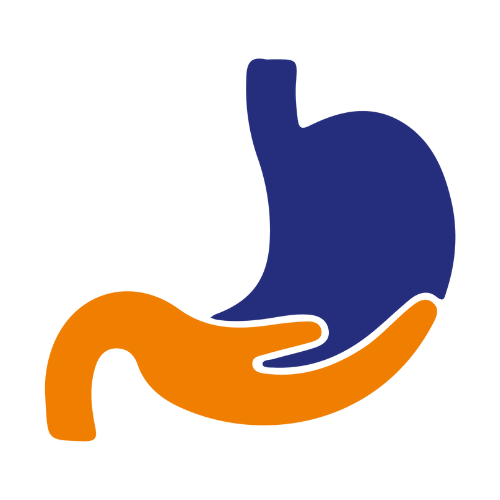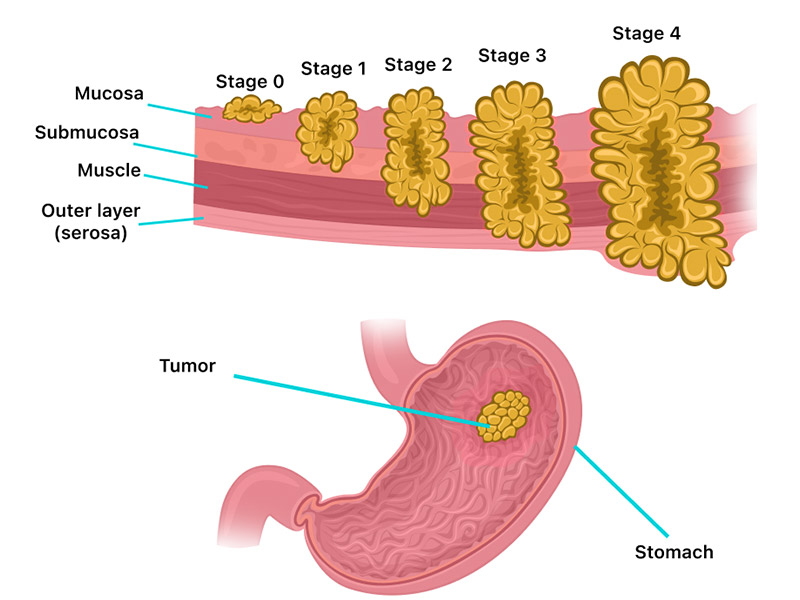Stomach Cancer
With stomach cancer, also called gastric cancer, cancer cells usually begin in the inner lining of your stomach. They then grow deeper into your stomach walls as the cancer develops. Most cases of stomach cancer involve abnormal cell growth in the place where your stomach meets your esophagus (gastroesophageal junction).
What are the Symptoms?
Stomach cancer doesn’t typically cause symptoms during the early stages. Even the most common early signs of stomach cancer — often unexplained weight loss and stomach pain — don’t usually show up until the cancer is more advanced.
Symptoms of stomach cancer include:
- Loss of appetite.
- Trouble swallowing.
- Fatigue or weakness.
- Nausea and vomiting.
- Unexplained weight loss.
- Heartburn and indigestion.
- Black stool (poop) or vomiting blood.
- Feeling bloated or gassy after eating.
- Stomach pain, often above your belly button.
- Feeling full even after eating a small meal or snack.
What are the Causes?
Stomach cancer forms when there’s a genetic mutation (change) in the DNA of your stomach cells.
DNA is the code that tells cells when to grow and when to die. Because of the mutation, the cells grow rapidly and eventually form a tumor instead of dying.
The cancer cells overtake healthy cells and may spread to other parts of your body (metastasize).Researchers don’t know what causes the mutation.
How is it Diagnosed?
A healthcare provider will review your medical history, ask about your symptoms and perform a physical exam that may involve feeling for a mass in your stomach. They may order several tests to diagnose and stage stomach cancer.
Staging allows your provider to assess how much the cancer has spread. With stomach cancer, staging ranges from 0 (zero) to IV (four). Stage 0 means the cancer hasn’t spread beyond your stomach lining. Stage IV means that it’s spread to other organs.
Upper endoscopy is commonly used to diagnose stomach cancer.
Endoscopic ultrasound is a special kind of endoscopy that can help stage the cancer.
Radiologic tests, including a CT scan, barium swallow and MRI, can help identify tumors and other abnormalities that may be cancer-related.
Blood tests can offer information about how your organs are functioning. Poor organ function may indicate that cancer has spread to that organ.
Laparoscopy is a type of surgery that allows your provider to assess cancer spread when less invasive methods, like imaging, haven’t provided enough information.
What are the Risk Factor?
Certain factors seem to increase the likelihood of developing stomach cancer. They include:
- Family history of stomach cancer.
- Helicobacter pylori (H. pylori) infection.
- Gastroesophageal reflux disease (GERD).
- Gastritis.
- Epstein-Barr virus infection.
- History of stomach ulcers or stomach polyps.
- A diet high in fatty, salty, smoked or pickled foods.
- A diet that doesn’t include many fruits and vegetables.
- Frequent exposure to substances like coal, metal and rubber.
- Smoking, vaping or chewing tobacco.
- Drinking too much alcohol.
- Obesity.
- Autoimmune atrophic gastritis.
Several genetic conditions are associated with increased gastric cancer risk, including:
- Lynch syndrome.
- Peutz-Jeghers syndrome.
- Li-Fraumeni syndrome.
- Familial adenomatous polyposis.
- Hereditary diffuse gastric cancer.
- Common variable immunodeficiency (CVID).
- Stomach cancer is more common in people with Type A blood
How is it Treated?
Treatment depends on how far your cancer’s spread, your health and treatment preferences.
Surgery
Doctor may recommend surgery to remove precancerous cells, a tumor, or all or part of your stomach.
Upper endoscopy: In the early stages, when the cancer is limited to your stomach’s superficial (uppermost) layers, the cancer can be removed through an upper endoscopy. In this procedure, a gastroenterologist cuts the tumor from your stomach wall and removes it through your mouth.
Gastrectomy: Once the tumor spreads beyond your stomach’s superficial layers, you’ll need surgery to remove all or part of your stomach. Subtotal gastrectomy removes the part of your stomach affected by the cancer. Total gastrectomy removes your entire stomach. Your provider will connect your esophagus to your small intestine so that you can still eat following total gastrectomy.
Additional treatments attack cancer cells directly.
Chemotherapy (chemo) uses drugs to shrink cancer cells, making them easier to remove before surgery. Chemotherapy can also kill the remaining cancer cells after surgery.
Radiation uses targeted energy beams like X-rays to destroy cancer cells. Radiation alone isn’t effective in treating stomach cancer, but it may be used alongside chemo before and after surgery.
Targeted drug therapy zeroes in on weaknesses in cancer cells, causing them to die. It’s often used with chemo in cancer that recurs (comes back) or that’s advanced.
Immunotherapy helps your immune system identify and destroy cancer cells that may be hard to detect. It’s most commonly used in recurring or advanced cancer.
Palliative care helps improve your quality of life as someone with a cancer diagnosis.

